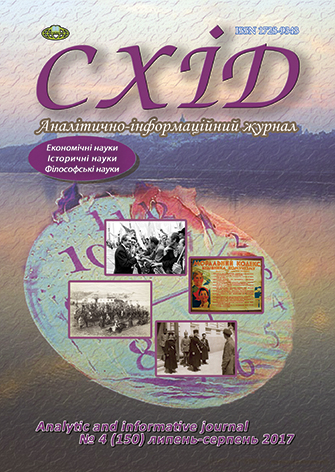The right to land ownership in the Black Sea and Kuban troops in the nineteenth and early twentieth centuries
DOI:
https://doi.org/10.21847/1728-9343.2017.4(150).111196Keywords:
Kuban, landed resources, black Sea cossack army, Kuban cossack army, economy, landownershipAbstract
The article deals with the peculiarities of the approach to land tenure in the tradition of the Black Sea and Kuban Cossack troops. These troops were a genetic continuation of the Zaporozhian Army and tried to preserve both their autonomy and a special economic status, which relied on the special principles of land use, which was commonly used both as stationary communities and the entire Army. The issues that are considered in the article are considered to be particularly relevant in the context of modern legislative searches for the most effective means of using Ukrainian land resources.
The authors of the article come to the conclusion that the maintenance of land resources owned by the stationary communities and all of the Black Sea troops, and subsequently Kuban, was an extremely important factor in its economic development and the preservation of its own status and ethnic identification of the Cossacks, and the struggle to preserve public ownership of the land fund was one of the priorities of the Black Sea / Kuban Cossacks, which did not stop until the beginning of the 20th century. In all provisions on the basic principles of the structure and economy of the Black Sea and Kuban Cossack troops, the land law was carefully fixed and emphasized, based on the joint ownership of the military land fund. At the same time, it caused a lot of conflicts, both with the imperial administration, and among the Ukrainians themselves of the Kuban, both Cossacks and "nonresident". At the beginning of the 20th century, most such conflicts were overcome due to the intensive development of the cooperative movement. In fact, the attitude of the imperial government to the Kuban as a colony, which was manifestly manifested in the forms of the economic outlook for the region, provoked a strong resistance, first of all, by the local Ukrainians, who, acting as a leading organized and cohesive force, found activity in the form of economic self-organization. First of all, this was manifested in the creation of credit unions.
All this allowed maintaining and modernizing the basic principles of the Cossack land tenure and resolving most of the conflicts that they caused. Unfortunately, further development was interrupted by the Bolshevik revolution and by the forced establishment of Soviet power in the Kuban.Downloads
References
Shcherbina, F. A. (1891), Land community of the Kuban Cossacks, Kuban collection: Proceedings Kuban. reg. extras. Committee, Vol.2, Yekaterinodar, pp. 1-208 (rus).
Macedonov, L.V. (1904), Economic situation and crafts of the population of the mountain villages of the Kuban region (issue 1), Kuban collection: Proceedings Kuban. reg. extras. Committee, Vol.10, Yekaterinodar: I. F. Boyko Typography, pp. 1-88 (rus).
Golobutsky, V. A. (1956), The Black Sea Cossacks, Publishing house of the Academy of Sciences of the Ukrainian SSR, Kyiv, p.244 (rus).
State Archives of Krasnodar Territory. Fond 764, opys 1, sprava 95, arkush 258.
Central State Archive of the Supreme Power and Administration of Ukraine. Fond 4465-p., opys 1, sprava 892, arkush 518.
Korolenko, P.P. (1911), Cossack resettlement for the Kuban in 1861: enclosed with documents and notes by Col. Sharap, Kuban collection in 1911: Proceedings of the Kuban. region mute. Committee, Vol.16, Yekaterinodar:Kuban region Board Typography, pp. 265-576 (rus).
Melnikov, L. M. (1900), Non-residential in the Kuban region, Kuban compilation: Proceedings of the Kuban. region mute. Committee, Vol. 6, Yekaterinodar, I. F. Boyko Typography, p.115 (rus).
The order of the common good (2006), Kubancollection: a collection of scientific articles on the history of the region, Vol. 1 (22), Book Ltd. Krasnodar, p.329-334 (rus).
The position on the Black Sea Cossack army (1842), The third continuation of the array of military provisions (from January 1, 1841 to January 1, 1843), Typography of the Second Section of the Own EA IV Office, рр. 208-291.
State Archives of the Krasnodar Krai, Fond 764, opys 1, sprava 95, arkush 20.
Sulyatytsky, P. (1925), Essays on the history of the revolution in the Kuban (III - 1917 - VІ - 1918), Ukrainian Institute of Cognitive Science in Prague, Prague, Vol. 1, P.42.
Downloads
Published
How to Cite
Issue
Section
License
Copyright (c) 2017 Dmytro Bilyi, Vasyl Futulujchuk

This work is licensed under a Creative Commons Attribution-NonCommercial-NoDerivatives 4.0 International License.
1. Authors bear responsibility for the accuracy of facts, quotations, numbers and names used.
2. Manuscripts are not sent back.
3. The publisher does not always agree with the authors' opinion.
4. The authors reserve the right to authorship of the work and pass the first publication right of this work to the journal under the terms of a Creative Commons Attribution-NonCommercial-NoDerivatives 4.0 International License. This license allows others to distribute (copy) the published work for non-commercial purposes, provided there is mandatory attribution to its authors and a link to the first publication in our journal.
5. The authors have the right to conclude separate supplement agreements that relate to non-exclusive work distribution in the form in which it has been published by the journal (for example, to upload the work to the online storage of the journal or publish it as part of a monograph), provided that the reference to the first publication of the work in this journal is included.

